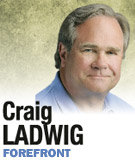Subscriber Benefit
As a subscriber you can listen to articles at work, in the car, or while you work out. Subscribe Now
 Some years ago, a Republican state senator phoned The Indiana Policy Review to ask why the journal was so critical of government unions.
Some years ago, a Republican state senator phoned The Indiana Policy Review to ask why the journal was so critical of government unions.
“Somebody’s got to represent those workers,” he argued.
Well, no they don’t. Compulsory collective bargaining for government workers is relatively new, dating only from the 1970s. And the resulting decline in both Indiana finances and our democratic processes is keeping the more thoughtful lawmakers awake at night.
These are the ones who know that the local teachers’ union or police union or firefighters’ union shares few characteristics with those romanticized organizations of the early- and mid-20th century—the miners, the carpenters, the plumbers, the steelworkers, the automakers.
By comparison, public-sector unions play with a stacked deck:
• When lobbying by public-sector unions leads to higher costs for the employer, the government, the burden is borne by someone else entirely, the taxpayer.
• Because bureaucracies tend to be static, so do public-sector unions; once workers have been organized, they tend to stay organized.
• Education and public safety, to pick the most significant examples, are legal monopolies. Consumers generally don’t have the option of abandoning them if they become inefficient.
• Finally, public-sector unions are private entities, “secret” in the sense that they will not be inviting you to their next executive session.
Indeed, “unions” should be in quotes to draw the above distinction. The teachers’ union, for example, is more accurately understood as a political machine, one that installs its own bosses and sets its own salaries within a tightly regulated government monopoly.
That GOP senator’s phone call was on my mind as I opened a letter from a friend, Eric Schansberg, an economist with Indiana University at New Albany. The letter held a clue as to why Republicans might be as indifferent as Democrats to the cost of government unions.
“Private sector unions are famously adversarial—as they work to extract gains from firms (and consumers) and promote legislation that restricts their product and labor market competition,” he wrote. “In contrast, public sector unions are collusive—as they work with politicians to benefit themselves at the expense of taxpayers with deep pockets because they pay little attention to politics.”
Schansberg sees some disturbing trends:
• State and local government workers received compensation in 2009 that was almost 50 percent more than private-sector workers. And the compensation of federal government workers is more than double the private sector.
• Civilian agency (non-military) jobs increased from 1.1 million in 2001 to 1.2 million in 2008 and to 1.4 million in 2010, growing most dramatically during the current recession.
• It is estimated that 20 million government workers and retirees are owed $2.4 trillion in pension benefits.
• Public-sector workers make $7,600 more in annual salary and $38,500 more in compensation than those in the private sector.
All of which represents the elephant in the room as legislators and the governor try to find a strategy that keeps us solvent and thereby improves Indiana’s competitive position. That will not be achieved until there is wider understanding of the consequences of compulsory public-sector collective bargaining.
For instance, few doubt that political deference to Indiana’s public-sector unions had something to do with a gross underestimation of Indiana’s “official” pension liabilities. Maryann O. Keating, a South Bend economist and author, tells me that independent experts put our actual liability at three times annual tax revenue.
Referring to this and other dire predictions, Schansberg concludes: “In a season of economic and political worries, it’s sobering to note that some of our biggest public-policy problems are just starting to register on the radar.”
Our ruin, then, absent heroic stances at the Statehouse and the Governor’s Office, is not only politically likely but mathematically certain.•
____________
Ladwig edits Indiana Policy Review, a journal studying local public policy. Send comments on this column to ibjedit@ibj.com.
Please enable JavaScript to view this content.
